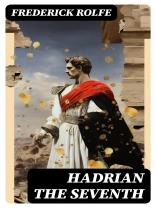In ‘Hadrian the Seventh, ‘ Frederick Rolfe delves into the fantastical and often surreal realm of a fictional pope, who, after a life of obscure failure, suddenly ascends to the papacy. The novel presents a rich tapestry of religious and existential themes, utilizing a poignant, flamboyant literary style that is both baroque and lyrical. Rolfe constructs an intricately layered narrative that explores the nature of power, identity, and spiritual awakening, set against the backdrop of a society rife with political machinations and theological quandaries. The prose mingles vivid imagery with a deeply introspective tone, reflecting Rolfe’s own complex relationship with faith and authority during a time marked by both artistic innovation and fervent debate within the Catholic Church. Frederick Rolfe, a figure often overshadowed by his contemporaries, draws heavily from his personal experiences of alienation and aspiration. Having struggled with issues of identity, social acceptance, and his own religious beliefs, Rolfe’s life as a Catholic convert and a self-styled maverick informs his portrayal of Hadrian, channeling his frustrations into a narrative that is both a critique and an exploration of ecclesiastical power structures. His unique perspective adds a profoundly personal dimension to the story, allowing readers to engage with the philosophical undercurrents that permeate the text. This novel is an exquisite exploration of the interplay between power and piety, making it a compelling read for anyone interested in the intersections of religion, art, and identity. ‘Hadrian the Seventh’ invites readers not only to witness the rise of an unlikely pope but to reflect on the nature of belief and authority in their own lives. Rolfe’s vivid imagination and profound insights ensure that this work remains a significant, if niche, contribution to early 20th-century literature.
عن المؤلف
Frederick William Rolfe, also known as Baron Corvo, was an English writer, artist, photographer, and eccentric, born on July 22, 1860, in London. Rolfe’s literary career is often best remembered for the novel ‘Hadrian the Seventh’ (1904), a work of astonishing imagination that presented an autobiographical fantasy in which the protagonist, an English writer, is unexpectedly elected Pope. This book showcases Rolfe’s idiosyncratic prose style, ornate and latinate, full of elaborate conceits and intricate phrasing. His works often explored themes related to Catholicism and pitted the beauty of ritualistic tradition against the imperfections of institutional religion, a topic close to the author’s heart given his own failed attempts at priesthood. An outsider, Rolfe frequently grappled with poverty and the neglect of his artistic endeavors, influencing the often bleak and bitter perspectives in his writing. Despite his novels’ limited popularity during his lifetime, posthumous interest in his unique voice has solidified Rolfe’s position as a minor cult figure in English literature. Rolfe’s other notable works include ‘The Desire and Pursuit of the Whole’ (1934) and ‘Stories Toto Told Me’ (1898), which further characterized his distinctive literary voice. He died in Venice on October 25, 1913, leaving behind a complex legacy marked by innovative writing that was both admired and misunderstood in his time.












